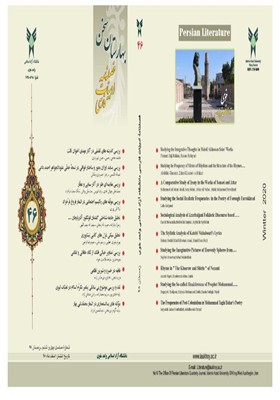تحلیل جامعه شناختی گفتمان فولکلور آذربایجان بر اساس داستان قاچاق نبی و ضرب المثلهای رایج از منظر گفتمان شناسی انتقادی
محورهای موضوعی : فصلنامه بهارستان سخنرسول بابازاده 1 , حبیب الله زنجانی 2 * , سیف اله سیف الهی 3
1 - دانشجوی دکتری گروه جامعه شناسی فرهنگی، واحد علوم و تحقیقات تهران، دانشگاه آزاد اسلامی ، تهران ، ایران
2 - گروه جامعه شناسی، واحد علوم و تحقیقات تهران، دانشگاه آزاد اسلامی، تهران – ایران.
3 - گروه جامعه شناسی، واحد علوم و تحقیقات تهران، دانشگاه آزاد اسلامی، تهران – ایران
کلید واژه: زبان, آذربایجان, کلید واژهها: فولکلور, نظریة گفتمان, نورمن فرکلاف,
چکیده مقاله :
چکیده در این مقاله پس از مروری بر چگونگی شکل گیری فولکلور آذربایجان و زمینههای ارتباط آن با مسائل ادبی، اجتماعی، سیاسی، تاریخی و فرهنگی، به علل و عوامل اثر گذار بر شکل گیری و تحوّل فولکلور اشاره شده است. برای تحلیل و تبیین از نظریههای تحلیل گفتمان لاکلا و موف، نظریة تحلیل انتقادی فرکلاف و نظریه تفسیر فرهنگ کلیفورد گیرتز به عنوان چارچوب نظری و مفهومی استفاده شده است و از روش تحلیل گفتمان انتقادی فرکلاف به عنوان روش تحقیق بهره گرفته شده است. دادههای متنی تحقیق از منابع معتبر فولکلوریک آذربایجان انتخاب شده و نمونههای تحلیل به روش نمونهگیری هدفمند برگزیده شده است. نتایج تحلیلی این تحقیق نشان میدهد که فولکلور آذربایجان به عنوان زبان شفاهی مردمان این ملت، با توجّه به فضای اجتماعی و سیاسی زمان خود، دارای گفتمانهای تقابلی مختلفی است که قاطبه مردم از آن برای بیان مقاصد، مطالبات و انتقادات خود از اوضاع و مناسبات اجتماعی، استفاده می کنند.
Abstract Having reviewed the formation of Azarbaijani folklore and its communicative background with literary, social, political and cultural problems, we have pointed out to the formation and development of folklore. We've used the analytical discourse of Laclou and Mouffe and critical theory of analysis of Fair Clough and cultural theory of interpretation of Clifford Geertz as a theoretical and implicational frame for the research. The textual data of the research have been taken from valid folkloric sources of Azarbaijan and the analytic samples have been chosen as purposeful sampling method. The analytical consequences of this research show that Azarbaijani folklore as the oral language of this nation, regarding the social and political atmosphere of its own time, has the different contrastive discourse which ranks its people to use and express their purposes; and acquire their wants together with their criticisms of their social conditions of the time.
فهرست منابع و مآخذ
17- مهدی زاده، سیّد محمّد، (1391)، نظریههای رسانه، اندیشههای رایج و دیدگاههای انتقادی، نشر همشهری.
18 -Barth. ferdrik (1969) "introduction". in ethnic groups and boundaries: the social organization of culture difference. by Fredrik barth. london: allen&unwin.
19-Fairclough. N. (1989) , Creativity and Struggle in Discourse: the discourse of Thatcherism in Language and power in social life. London: Longman.
20 -Fairclough Norman (1992) Discourse and Social Change, Cambridge polity.
21 -Geertz. c. (1973) the interpretation of cultures: selected essays. newyork. basic books. -
22 -Knike, D. Felson, R. 1974. Ethnic stratification and politication Cleavage in the U. S. pp: 1952-1968-
23 -Mouffe, Chantal. (2005), On the Political. Routledge: New York.
24 -storry,john(1997)an introduction to cultural theory and popular culture,2nd edn. Routledge: New York
25 -Van Dijk, Teun A.(2008), Discourse and Powe, new York,Palgrave,Macmillan.
_||_
